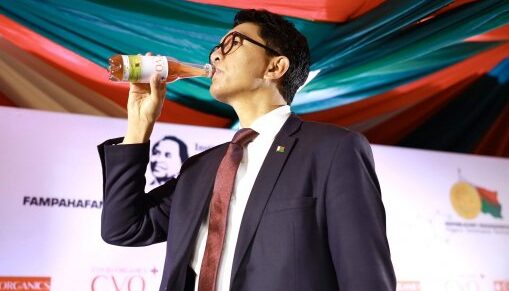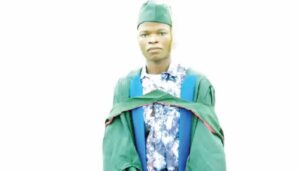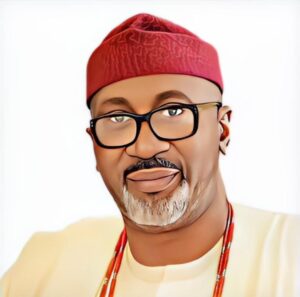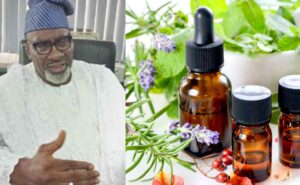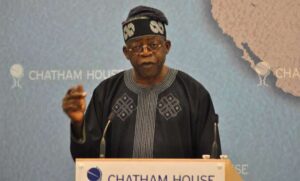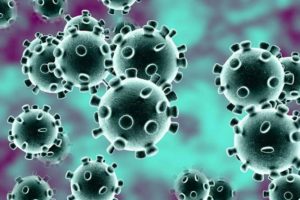Could traditional African medicine “change the course of history” in the combat against COVID-19? Madagascar President Andry Rajoelina believes so, and he is also convinced that the island country has a special role to play in stemming the pandemic.
On the evening of 8 April, the head of state made a surprising revelation to his fellow citizens on national television: “I received a letter on 24 March indicating that Madagascar possesses a remedy that could – and I say could because it has not yet been proven – cure the coronavirus.”
While staying mum about the name of the miracle remedy derived, he said, from a “medicinal plant”, Rajoelina added that Madagascar could potentially “change the course of history” thanks to this discovery.
Confidential
What plant was the president referring to? And what evidence does he have to back up his statements? Initially, his staff seemed caught off guard.
“We’ll find someone who can answer your questions, but please call back later,” an official source from Madagascar’s Ministry of Health said, while one of the president’s advisers dodged our queries, saying that “further clarification is forthcoming, I’ll keep you posted.”
At the Malagasy Institute of Applied Research (IMRA), which specialises in the study of medicinal plants, our contact gave no more information: “We’re working on a potential remedy, but it’s confidential.”
Four days later, the president’s remarks made a comeback on social media.
On Easter Sunday, Rajoelina reiterated his conviction about the discovery of an antidote to COVID-19 in two back-to-back tweets: “On this Easter Sunday, #Madagascar would like to send a message of hope to the world with the help of our biodiversity, 80% of which are endemic species. To tackle #COVID-19, we will be able to propose an enhanced traditional remedy made up of Malagasy medicinal plants which have already been proven effective.”
This time around, he described the antidote as involving more than one plant.
“As we await the clinical trial results, we are confident that we will be able to change the course of history in this global war being waged against the pandemic. We are also going to conduct laboratory testing during which the drug will be administered to patients in different formats,” he added in another tweet later that same day.
Although the president continues to pursue his conviction and has given his approval of further study, the plants involved remain a complete mystery. In Madagascar, none of the individuals able to specify which plants are likely to cure COVID-19, as the head of state alluded, are willing to talk.
Small clue to shed light on this mystery
The only clue capable of shedding light on this mystery is a letter written in French and from which Rajoelina quoted a short excerpt during his televised speech. Jeune Afrique was able to get its hands on a copy.
Dated 24 March, the letter was sent by Lucile Cornet-Vernet, founder and vice president of La Maison de l’Artemisia.
Based in Paris, this humanitarian organisation with a presence in 23 African countries, including Madagascar, promotes artemisia annua and artemisia afra; two medicinal plants with antimalarial properties, “to the most vulnerable populations in the Southern Hemisphere.”
According to La Maison de l’Artemisia, “both plants have been used in traditional medicine for centuries in China and East Africa.”
While not endemic plants, these two varieties of artemisia (also known as sweet wormwood) are nevertheless widely grown in Madagascar. What’s more, the French organisation believes that they have a promising potential to treat COVID-19.
“We’ve written to the health ministries of just about every government in Africa,” said Ms Cornet-Vernet, founder and vice president of La Maison de l’Artemisia. “The documentation we sent them included, in particular, a review of scientific research and proposed clinical trial protocols.”
She added: “There is a lot of conjecture that artemisia is useful in the treatment arsenal for the virus, but that doesn’t mean I’m saying that this plant cures COVID-19.”
Cornet-Vernet told Jeune Afrique that she sent these documents along with an introduction letter to Madagascar’s Health Minister Ahmad Ahmad on 24 March. In the letter, she immediately called attention to the fact that China used artemisia to combat COVID-19.
“African countries would be well advised to also embrace this treatment by carrying out clinical trials as soon as possible,” she wrote.
Also contained in the letter is the passage President Rajoelina read out loud live in French in front of the cameras on 8 April, in which he spoke of the need to “[put] in place local, innovative and effective strategies to protect [the] populations. Artemisia annua may be a valuable alternative treatment for COVID-19, both in preventive and curative approaches.”
However, the head of state did not explicitly mention “artemisia annua” in his speech.
A low-cost treatment
Writing to the Health Minister Ahmad, the vice president of the Paris organisation added: “Your decision has the power to change the course of history.”
Rajoelina would later reuse this very same expression on television and Twitter.
According to Cornet-Vernet, around 10 African countries have already agreed in principle to perform clinical trials focused on artemisia, including Benin, Central African Republic, Côte d’Ivoire, Democratic Republic of Congo, Madagascar and Rwanda.
For its advocates, the infusion derived from this plant has potential as a low-cost treatment for COVID-19, after having proven its efficacy against malaria.
“Unlike other pharmaceutical drugs, the plant doesn’t require a full-fledged production chain and it also allows us to avoid issues like drug counterfeiting,” said Jean-Luc Galabert, one of the founders of the Rwandan research firm Inter-Culturel, which is working hand-in-hand with La Maison de l’Artemisia.
Ten days after Rajoelina’s televised address, people from the president’s inner circle finally began to talk.
“I can confirm that the remedy is primarily made up of artemisia and ravensara”, one of the president’s advisers said, admitting that the text read by the president on television came from La Maison de l’Artemisia.
According to the same source, researchers at IMRA have been working for over a month on the remedy, in cooperation with foreign researchers.
“Madagascar has the world’s largest supply of artemisia,” one of our contacts said, before adding that a special programme will be broadcast on a Malagasy national channel on the evening of Sunday, 19 April, during which “the president will announce the timeline and discuss the clinical trials.”
A Brazilian prophet
This explanation was very welcome once an 18-minute-long documentary broadcast on 16 April by the Madagascar National Television (TVM) network – and advertised on Rajoelina’s Facebook page – complicated the president’s message.
The documentary also aired on Viva, Rajoelina’s television channel. Based on an interview with two pilots who work Sky Services, a private airline company, it tells the story of a Brazilian prophet’s esoteric journey in Madagascar in November. During her trip, Joana Andréa de Araujo flew over the island in a plane following a cross-like path, from north to south and east to west, before formulating the following prophecy: the world will soon experience a terrible pandemic. But Madagascar will hold the cure.
“The airing of this documentary a few days after the president’s announcement about a potential plant-based drug looks an awful lot like pure storytelling,” said a Malagasy media expert.
But for a population deeply steeped in mysticism, could such storytelling – blending traditional medicine and divination – build support for the drug?
“This documentary is revealing of the fact that, here in Madagascar, various political leaders don’t hesitate to borrow from the prophetic playbook, thinking that their voters embrace this kind of storytelling,” commented Toavina Ralambomahay, a political scientist and opposition party representative serving on the Antananarivo city council.
Ahead of the November 2018 presidential election, Pastor André Mailhol, head of the Apocalyptic Church and presidential candidate, insisted that he would be elected president, in accordance with a prophecy. In the end, he finished fourth in the first round, obtaining 1.27% of the vote.
Studies are just getting underway
Madagascar already has the capacity to grow and produce artemisia. An executive from one of the sector’s leading companies, Bionexx, said that each year it produces 25 tonnes of artemisinin, the plant’s medicinal active ingredient, i.e., a share of around 10% of the global market.
But what are the potential benefits of this plant, typically consumed as an infusion, when it comes to treating COVID-19?
Scientific studies are just getting underway. The renowned Max Planck Institute in Germany, which has received 18 Nobel prizes since 1948 and publishes 15,000 papers each year, launched an in vitro trial on 8 April, in collaboration with the US company ArtemiLife and Danish researchers.
In a press release, the research institute explained that studies have shown artemisia annua to be somewhat effective against a virus similar to the novel coronavirus.
“Given the similarities between those two viruses, plant extracts and artemisinin derivatives need to be tested against the new coronavirus,” said Professor Peter Seeberger, Director at the Max Planck Institute of Colloids and Interfaces.
According to Catherine Hill, an epidemiologist and former department head at the Institut Gustave Roussy in Villejuif, France: “The fact that artemisia has effects on viruses similar to the novel coronavirus makes a strong case for initiating studies. However, in vitro data is needed before data can be obtained using actual patients, otherwise, we obviously have no proof that artemisia is effective against the coronavirus.”
Currently, a number of other substances are already being studied, such as hydroxychloroquine alone or in combination with azithromycin, Kaletra (used to treat HIV/AIDS) and remdesivir.
What about ravensara?
“It’s [ravensara] one of the most powerful antiviral plants grown in Madagascar,” said Jean-Claude Ratsimivony, CEO of JCR group, which manufactures an antiviral ointment under the name Fosa.
IMRA also markets a similar product, ATA, which has been selling extremely well during the pandemic.
“Whatever the plant, we need more precise data before we can say that it’s effective against COVID-19,” said Olivier Rakotoson, president of Madagascar’s essential oil exporters union.
He added: “And even if the results are good, we still have to determine if the virus has been killed because the substance has boosted the immune system’s defences or if it acts directly on the virus.”
Used in a curative or preventive capacity, ravensara has in any case been a huge commercial success. “Over the past few weeks, in Madagascar and abroad, its price has tripled or quadrupled,” Rakotoson said.
He continued: “Ten years ago, the price of ravensara also skyrocketed during the H1N1 virus epidemic.”
“Madagascar has been chosen by God”
As of 11 April, the country had reported 82 cases of COVID-19, along with 39 recovered patients and no deaths at that point in time. On 12 April, Rajoelina demystified the speculation surrounding a potential remedy derived from plants grown on the island.
In his previous address, he showed unshakable confidence in his country’s ability to help combat the novel coronavirus: “Of course, unlike many other countries, Madagascar doesn’t have nuclear or chemical weapons. But as my intuition has told me, Madagascar will shine. I have faith in that.”
At 8:45 p.m. that Sunday, Rajoelina came on television.
“Madagascar has been chosen by God,” he said at the beginning of his speech, referring to the fact that nobody in the country had died from COVID-19.
Then, he revealed a “preventive and curative” artemisia-based remedy called Covid-Organics, saying that tests were conclusive.
IMRA developed the product, which debuted on Monday, 20 April.
Madagascar’s President Andry Rajoelina says a traditional remedy for the coronavirus – “Covid-Organics” has been launched. Covid-Organics will be distributed for free to the most vulnerable in the country and sold at a very low price to others. https://twitter.com/ginasondo/status/1252167761989681152 …
Gina Sondo@GinaSondo
Madagascar is set to launch an improved traditional remedy for the coronavirus – “Covid – Organics” today. Pres. Rajoelina says the remedy produced by researchers from the Malagasy Institute of Applied Research, Antananarivo, cures & prevents #COVID19. https://ginainforms.com/madagascar-set-to-launch-traditional-remedy-for-coronavirus/ …
However, the president did not utter a word about La Maison de l’Artemisia, the organisation behind the letter sent to the president on 24 March.
The latest news is that Rajoelina announced an easing of the country’s lockdown measures: people will be free to go about as they please from 6 a.m. to 1 p.m. and some secondary school students will be back in class as of 22 April, provided that they drink Covid-Organics as a preventive measure.
On social media, a heated debate has already erupted between those who trust the product… and everyone else.

